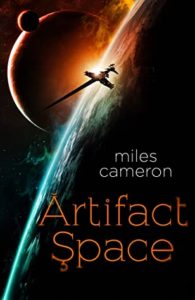
We’re living in a world with way more quality genre fiction than I could ever read. And it would be so easy to find a narrow niche and just stick to it, with new material coming out fast enough to keep me satisfied indefinitely. But part of the fun of reading is finding new loves, and part of that is pushing past your comfort zone. Fantasy Bingo is one of my favorite ways to force myself to read in different categories, but following a variety of reviewers also helps a whole bunch in finding new perspectives in the genre, or even refreshing takes on older perspectives that makes me reevaluate something I’d dismissed. After all, I used to think I disliked hard sci-fi, but then I read Children of Time and The Steerswoman and I have been thoroughly disabused of that notion. But the military sci-fi subgenre has remained a struggle. I’ve just never been especially interested in navies, and military sci-fi tends to be navies in space. But there are certain corners of my reviewing circles that have been hyping Miles Cameron’s Artifact Space to the moon and back, and so I thought now was as good a time as any to give the subgenre another try.
And Artifact Space is nothing if not a naval novel in space—unless we want to get more specific and call it a Merchant Marines novel in space. It stars Marca Nbaro, barely escaped from an exploitative orphanage onto the Greatship Athens, an enormous ship that serves to facilitate trade between the human sphere and a distant and poorly understood alien culture. But something is destroying Greatships, and if the crew of the Athens can’t figure out how to stop it, they may be next.
If you enjoy watching a smart heroine learning the ropes on her first deployment, Artifact Space will be a treat. It’s smoothly written and spares no detail in telling the story of Nbaro’s journey from a fresh-faced midshipper to a key figure in the fight for the survival of the Athens. If you don’t particularly care for naval details—and I don’t—you’ll see more than you care to, but the crises interspersed regularly throughout the narrative should still be enough to prevent the novel from dragging.
Unfortunately for me, Artifact Space opens a duology, and the plot points that most caught my eye are backloaded into the second book. There’s plenty of plot to pack the first entry, no doubt, with lots of investigation into who could be attacking Greatships and what vulnerabilities Athens has that may be exploitable. But we don’t really get to know many different factions, so the first question is less of a whodunnit with an established list of suspects and more of a mystery with the major players uncertain. The details of potential vulnerability, on the other hand, get plenty of page time, and readers who enjoy getting into the nitty-gritty will have a lot to love here. But for me, it runs into the problem of not wanting all the naval details and then seeing the main series-opening plot be all about naval details.
Lurking in the background is the impending contact with the poorly-understood alien culture, and interspersed on the journey are several mysterious ruins that may belong to that or another alien society. And those storylines fascinate me. But they just get relatively little focus in comparison with the naval vulnerability plot. There is progression on this point, and the book ends with a degree of accomplishment, but the contact storyline feels more like prologue than like a main story.
Ultimately, Artifact Space does a lot things well that aren’t especially to my taste, and it only teases on the elements that most excited me. The prose and characters are solid, but they aren’t quite enough to capture my interest when the plot spends so much time on what I consider to be less interesting details. So this is an example of a story that won’t get an especially high score from me, but where I recognize that taste mismatch is playing a larger-than-average role, and that I may still recommend to other readers who are a better fit for the subgenre.
Recommended if you like: military sci-fi, competent naval officers.
Can I use it for Bingo? It’s hard mode for Set in Space and Wibbly Wobbly Timey Wimey, and the aliens are enough to argue for Weird Ecology (though they don’t get much page-time, and I expect to see more in the second book). It also has No Ifs Ands Or Buts.
Overall rating: 13 of Tar Vol’s 20. Three stars on Goodreads.
